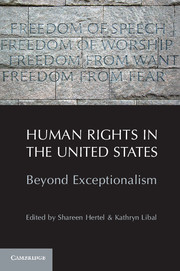Book contents
- Frontmatter
- Contents
- Contributors
- Acknowledgments
- Foreword: Are Americans Human? Reflections on the Future of Progressive Politics in the United States
- 1 Paradoxes and Possibilities: Domestic Human Rights Policy in Context
- SECTION I STRUCTURING DEBATES, INSTITUTIONALIZING RIGHTS
- SECTION II CHALLENGING PUBLIC/PRIVATE DIVIDES
- SECTION III FROM THE MARGINS TO THE CENTER: MAKING HARMS VISIBLE THROUGH HUMAN RIGHTS FRAMING
- 10 The Law and Politics of U.S. Participation in the UN Convention on the Rights of Persons with Disabilities
- 11 The Anomaly of Citizenship for Indigenous Rights
- 12 Human Rights Violations as Obstacles to Escaping Poverty: The Case of Lone-Mother-Headed Families
- 13 The Human Rights of Children in Conflict with the Law: Lessons for the U.S. Human Rights Movement
- 14 LGBT Rights as Human Rights in the United States: Opportunities Lost
- 15 No Shelter: Disaster Politics in Louisiana and the Struggle for Human Rights
- APPENDIX 1 Universal Declaration of Human Rights
- APPENDIX 2 International Covenant on Economic, Social and Cultural Rights
- APPENDIX 3 International Covenant on Civil and Political Rights
- Index
- References
11 - The Anomaly of Citizenship for Indigenous Rights
Published online by Cambridge University Press: 05 June 2012
- Frontmatter
- Contents
- Contributors
- Acknowledgments
- Foreword: Are Americans Human? Reflections on the Future of Progressive Politics in the United States
- 1 Paradoxes and Possibilities: Domestic Human Rights Policy in Context
- SECTION I STRUCTURING DEBATES, INSTITUTIONALIZING RIGHTS
- SECTION II CHALLENGING PUBLIC/PRIVATE DIVIDES
- SECTION III FROM THE MARGINS TO THE CENTER: MAKING HARMS VISIBLE THROUGH HUMAN RIGHTS FRAMING
- 10 The Law and Politics of U.S. Participation in the UN Convention on the Rights of Persons with Disabilities
- 11 The Anomaly of Citizenship for Indigenous Rights
- 12 Human Rights Violations as Obstacles to Escaping Poverty: The Case of Lone-Mother-Headed Families
- 13 The Human Rights of Children in Conflict with the Law: Lessons for the U.S. Human Rights Movement
- 14 LGBT Rights as Human Rights in the United States: Opportunities Lost
- 15 No Shelter: Disaster Politics in Louisiana and the Struggle for Human Rights
- APPENDIX 1 Universal Declaration of Human Rights
- APPENDIX 2 International Covenant on Economic, Social and Cultural Rights
- APPENDIX 3 International Covenant on Civil and Political Rights
- Index
- References
Summary
All ye men of Congress, we wish you to help us. You do things all over the world. I want you to help us keep this thing citizenship away from us. That is all I have to say; but what I know I tell the truth.
Pa-Hang-Ga-Ma-Ne, the man that walks in front, Omaha, 1888 Petition to CongressCitizenship has an anomalous status in the struggles of native peoples for human rights. Citizenship is often understood as a regrettable but necessary prerequisite to securing human rights, and the gradual extension of citizenship to broader segments of the population is seen as the triumph of human rights in the United States. Although this is largely true, it overlooks an important ambiguity with respect to American Indians that highlights the deficiencies of a human rights model that takes the state and the individual as its fundamental categories. The struggle for indigenous rights throughout history has not been only – or even primarily – to gain rights for native people as individuals separate from tribal communities, but to secure their right to self-determination as political entities distinct from states. International human rights law has only just begun to formally recognize this right, but it was at the heart of the earliest debates on international law. Although some native people sincerely did seek citizenship, in U.S. history calls to provide citizenship to American Indians were repeatedly linked to efforts to deny them self-determination.
- Type
- Chapter
- Information
- Human Rights in the United StatesBeyond Exceptionalism, pp. 217 - 233Publisher: Cambridge University PressPrint publication year: 2011



